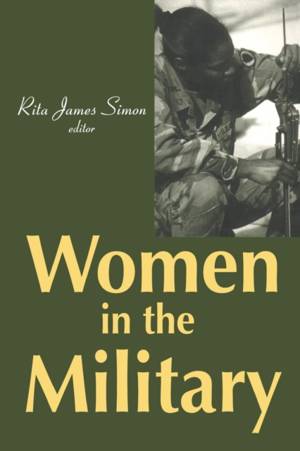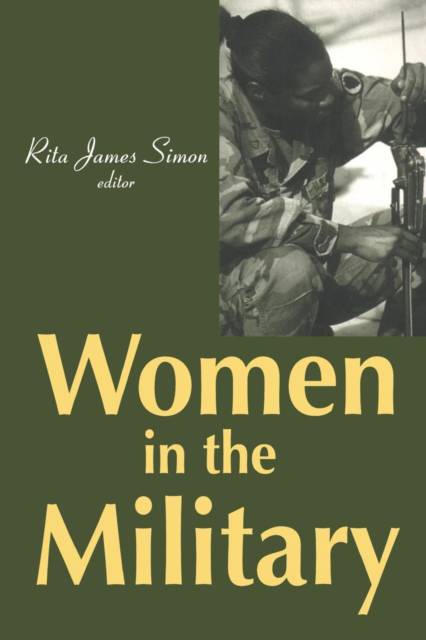
- Afhalen na 1 uur in een winkel met voorraad
- Gratis thuislevering in België vanaf € 30
- Ruim aanbod met 7 miljoen producten
- Afhalen na 1 uur in een winkel met voorraad
- Gratis thuislevering in België vanaf € 30
- Ruim aanbod met 7 miljoen producten
Zoeken
Omschrijving
The role, status, and treatment of women is one of the major issues confronting the military today. This volume provides a range of perspectives on the magnitude of concerns, the sources of problems, how issues might best be addressed, and the future for women in the armed services. It is based on a special issue of the journal Gender Issues, supplemented with additional contributions from leading scholars.
Historical and theoretical perspectives are provided by Lorry M. Fenner and Jean Bethke Elshtain. Fenner focuses on the role of women in the military since 1940, and argues for broader inclusion of women as well as other groups that have previously been restricted from full participation. Elshtain analyzes the extraordinary ability of war to draw both women and men into civic life, and observes how it calls forth and establishes a sense of particular identity for both men and women. Critical views are provided by other scholars. Laura L. Miller examines the feminist movement's insistence on full participation in combat units. Former Army chaplain Marie deYoung provides qualitative and quantitative data on military readiness and unit cohesion in mixed gender units. Leading military scholars (Mady W. Segal, David R. Segal, Jerald G. Bachman, Peter Freedman-Doan, and Patrick M. O'Malley) review national surveys comparing male and female high school seniors' responses to surveys conducted on questions about their propensity to enlist. Male-female differences are also addressed by Judith Hicks Steihm, who looks at the opinions each group has about the capabilities and performance of women. She finds differences by rank on questions as to how hard female soldiers work as compared to male soldiers and whether women are ready for combat duty. Historically, the military has provided minorities equal opportunity. Brenda L. Moore and Schulyler C. Webb examine whether or not this is still perceived to be the case in today's Navy. They focus on different perceptions by women and men, and by African American women in particular. Finally, William O'Neill examines whether the post-cold war downsized military will find women soldiers more or less important. Drawing upon social science research, historical data, and contemporary opinion surveys, Women in the Military is a cutting-edge assessment of a major gender issue in the United States. It will be valuable to researchers in women's studies, as well as those teaching courses in sociology, history, and military studies. Rita James Simon is University Professor in the School of Public Affairs and the Washington College of Law at American University. She is the editor of Gender Issues and author of The American Jury, the Insanity Defense: A Critical Assessment of Law and Policy in the Post-Hinkley Era (with David Aaronson), Adoption, Race and Identity (with Howard Alstein), In the Golden Land: A Century of Russian and Soviet Jewish Immigration, Social Science Data and Supreme Court Decisions (with Rosemary Erickson), and Abortion: Statutes, Policies, and Public Attitudes the World Over.Specificaties
Betrokkenen
- Auteur(s):
- Uitgeverij:
Inhoud
- Aantal bladzijden:
- 206
- Taal:
- Engels
Eigenschappen
- Productcode (EAN):
- 9780765806192
- Verschijningsdatum:
- 31/12/2000
- Uitvoering:
- Paperback
- Formaat:
- Trade paperback (VS)
- Afmetingen:
- 148 mm x 228 mm
- Gewicht:
- 308 g

Alleen bij Standaard Boekhandel
+ 180 punten op je klantenkaart van Standaard Boekhandel
Beoordelingen
We publiceren alleen reviews die voldoen aan de voorwaarden voor reviews. Bekijk onze voorwaarden voor reviews.











